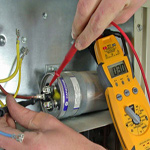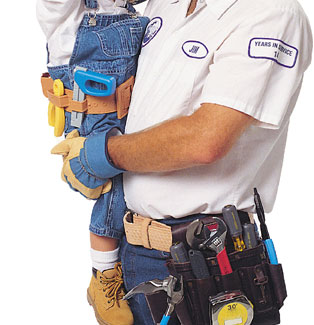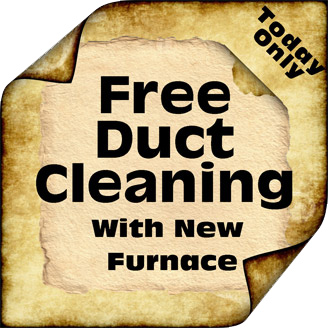The Do's and Don'ts of Home Improvement |
||||
|
||||
The statutory and common law impositionsThe statutory and common law imposition of duties imposes strict rules of disclosure on sellers. The quantities and qualities of litigation arising from alleged inadequate disclosure statements from sellers and agents underscore the need for a greater understanding of the disclosure process when selling a new home. This web page brings to light only a small portion of the disclosure process as it affects the mechanical systems of the home, the heating and air conditioning and the heating and air conditioning air conveyance systems. Air conveyance system is the lawyerly phrase for ductwork. This page explains in plain detail some of the real estate disclosure requirements. Before we go any further I would like to inform you that I am not a lawyer, don’t want to be, and this is a summation of the problems caused by too many lawyers in California coupled a great deal of liberal thinking. That thinking and those court actions and legislative action have has forced society to take on all the blames and problems and leave everyone with no responsibility whatsoever. Government’s job has turned from keeping you safe to babysitting while making sure that you the one paying for your own babysitter. The tip is what the lobbyists take. All homes get inspected.When you go to sell or buy a home the home gets inspected by a certified building inspector. This isn’t the building inspector for the city. This isn’t someone who has 20 years in the construction field and has operated construction companies. What does a home inspection include?“A complete inspection includes a visual examination of the building from top to bottom. The inspector evaluates and reports their unbiased opinion on the condition of the structure, roof, foundation, drainage, plumbing, heating system, central air-conditioning system, visible insulation, walls, windows, and doors. Only those items that are visible and accessible by normal means are included in the report.”
|
||||
If you have new ducting, don’t you think the inspector will notice it? |
If you have a new air conditioner, don’t you think the inspector will notice it? |
If you have a new furnace, don’t you think the inspector will notice it? |
They will and they will note it on their inspection sheet. Where they note it on the inspection sheet they will be a recommendation that the city permit be verified. In other words, that the system was permitted and it passed the permit process. Reading a real estate inspection report is like reading a “I’m not responsible for anything” checklist. They accept no responsibility for anything, any act or omission, and repeatedly state to have experts in each home improvement field check out the systems in the home. If the inspector suspects that the home improvement, a new air conditioner, new ducting or new furnace, has not been permitted or has not passed inspection, they will flag the installation and recommend a city inspection or an inspection by a qualified individual.
 This is where the troubles first start
This is where the troubles first start
This is where your troubles first start when you selling a home and this is where you can start to identify the problems with a home before you purchase it. In this case the buyer sends out their own heating and air conditioning professional who inspects the system. It is very easy to spot the systems that have passed through the permit process. The ducting is attached improperly, it isn’t sealed, the furnace and evaporator coil are mismatched, the copper lines connecting the inside coil to the outside air conditioner will be the wrong size and the outside unit isn’t sitting on a proper pad, the electrical isn’t up to code and the fuses are the wrong type. Getting further into the system we find that the Freon levels are wrong, the wrong amount of heat transfer is occurring between the inside coil and the Freon and the ducting is radically undersized.
This is not make believe.
This is not an exaggeration and it certainly is not rare.

We catch poor quality bad installations that people have paid good money for every single day we work. It is very common. Therefore, what can we do as a professionally licensed heating and air conditioning company? We write it up and give an estimate to correct the problems. The seller gets very upset as they see an end to closing of the real estate unless they negotiate dollar amounts with the buyer. Sometimes those dollars are decreasing the selling price of the home by many thousands of dollars.
The real estate agents try to protect themselves
When you purchase a home or when you sell a home the real estate agent is going to try and force the purchase of a home warranty agreement. This is a home warranty covering the appliances and defects that occur the first year. This is actually for the real estate agent and the broker’s protection as they are people that they are going to complain to in the event that something breaks down. It relieves them of problems and it can relieve you of non-disclosure problems as the seller, at least in the short term. Most new homeowners are going to be satisfied that their plumber or HVAC mechanic will fix the small problems that come up during the first year of ownership. I think they are a good thing, but they only cover the minor little things that break.
The home warranty companies tries to protect themselves
In those polices there are significant limits to protection and if you are thinking that you are covering all your bases by getting this protection, you are far from right. Most of these policies exclude pre-existing conditions and non-code approved installations. Guess what? That Furnace and air conditioning system that was installed without permits in your attic probably needs significant alterations to become approved and work properly. Those are not covered. Altering the ducting for one room being too hot and one room being too cold is not covered. Installing a pan under the evaporator coil in the attic to protect you from flooding condensation stoppages is not covered. Resizing the copper lines connecting the outdoor unit and the indoor unit is not covered. Upgrading the electrical to the air conditioner because someone saved money installing wires that were small is not covered. Replacing the compressor when that compressor failed because the air conditioner was installed too close to the home and lack proper airflow to regulate the heat buildup is not covered. These are real problems that occur very frequently.
The home warranty HVAC repair company tries to protect themselves.
 More than 25 years old I worked for a number of these home warranty companies. The way they pay for labor dictates a minimal amount of labor. In other words, the work that you perform, the less money that you make. I would make nearly the same amount of income for changing out a thermocouple and a incoming water valve as I would to replace and entire water heater. Do you think I wanted to replace a water heater? Not if I could help it. If the compressor in the outdoor unit dies and needs to be replaced, they will cover the cost of replacing the compressor even if the outdoor unit is 25 years old and is falling apart leaving the service technician to work on an antique that is only going to break down again and again and again. The technician will then request to you that you cash out your policy and apply that money towards a new outdoor condensing unit. The cash out amounts are not very high and they won’t even pay for the materials. You lose. The policy is written that way.
More than 25 years old I worked for a number of these home warranty companies. The way they pay for labor dictates a minimal amount of labor. In other words, the work that you perform, the less money that you make. I would make nearly the same amount of income for changing out a thermocouple and a incoming water valve as I would to replace and entire water heater. Do you think I wanted to replace a water heater? Not if I could help it. If the compressor in the outdoor unit dies and needs to be replaced, they will cover the cost of replacing the compressor even if the outdoor unit is 25 years old and is falling apart leaving the service technician to work on an antique that is only going to break down again and again and again. The technician will then request to you that you cash out your policy and apply that money towards a new outdoor condensing unit. The cash out amounts are not very high and they won’t even pay for the materials. You lose. The policy is written that way.
Home Warranty Repair Companies Don’t Want You to Know This.
The easiest way for home warranty repair provider to protect themselves from larger low paying jobs and supplement their income when working for the home is to find a code violation and then inform the home warranty company. The home warranty company will then deny the policy coverage based on the fine print of the contract. The technician is then free to “sell” the homeowner on the needed repairs. The technician gets his pay for showing up and diagnosing the problem and then is paid again to fix the problem. It is double dipping. The polices are written this way.
Those Home Warranties are Protection Placebos
 Sure they make you feel good and they give you impression that everything is covered, but in reality what you have settled for is very limited coverage and that coverage is being performed by contractors with very little experience (why would you work for a pay scale that is less than one third the market rate if you knew what you were doing?) and those repair providers are working to minimize the amount of repair work being performed. Non code upgrades, repair the broken part even if the appliance should be replaced and then try for additional repairs outside the scope of coverage. These repair providers have flat rate amount for most of the work that they perform. A fuse replacement in the outdoor unit that take 15 minutes start to finish pays the same labor as a full tune up that takes an hour and half. In essence, if the repair provider performed the needed tune up they would be working for free for an hour and 20 minutes. No one wants to do that and no one can afford to that. This means that the HVAC mechanic simply will not inform you of the needed yearly tune up and will walk away. You’ll think your air conditioner is running great, it’s cooling now, but in reality your system is lacking many vital btu’s of cooling and is driving your electricity rates up through the roof. The polices are written that way.
Sure they make you feel good and they give you impression that everything is covered, but in reality what you have settled for is very limited coverage and that coverage is being performed by contractors with very little experience (why would you work for a pay scale that is less than one third the market rate if you knew what you were doing?) and those repair providers are working to minimize the amount of repair work being performed. Non code upgrades, repair the broken part even if the appliance should be replaced and then try for additional repairs outside the scope of coverage. These repair providers have flat rate amount for most of the work that they perform. A fuse replacement in the outdoor unit that take 15 minutes start to finish pays the same labor as a full tune up that takes an hour and half. In essence, if the repair provider performed the needed tune up they would be working for free for an hour and 20 minutes. No one wants to do that and no one can afford to that. This means that the HVAC mechanic simply will not inform you of the needed yearly tune up and will walk away. You’ll think your air conditioner is running great, it’s cooling now, but in reality your system is lacking many vital btu’s of cooling and is driving your electricity rates up through the roof. The polices are written that way.
Do this Home Warranties Protect the Seller From Non-Disclosure
Not a chance. In fact these protection policies may actually add to the danger of the new homeowner finding out that work was done illegally and is non code approved. The new homeowner is far more likely to call out a HVAC mechanic when the home is not cooling to their liking, but still cooling, if they know that they only have to pay $50 or so for the service visit. Nearly half of the service calls I performed some 25 years old for those home warranty companies I performed no repair whatsoever. I still received my one hour pay, but just checked the systems out and informed the new homeowners that the system will only perform as good as it is designed to. The more times that an HVAC mechanic is called to the home the more likely that one of them will spot the non-code approved installation and inform the new homeowner of the problems.
When do you need a permit?
The 2007 California Building Code requires a permit any time an homeowner intends to construct, enlarge, alter, repair, move, demolish, or change the occupancy of a building or structure, or to erect, install, enlarge, alter, repair, remove, convert or replace any electrical, gas, mechanical or plumbing system. This means that anytime you replace or add new ducting, anytime you install a new central furnace and anytime you install a new outdoor condensing unit. A permit is not required when the evaporator coil is replaced as it is only a component and no electricity is directly hooked up to it.
How Can I Get my Old HVAC Installation Code Approved
This is big one and it is very problematic. Guess what, you are even in worse shape now that it is past January 1, 2010. The codes and rules governing installation now are very different than they were a few years old. Your older system will not pass new construction standards. The minimum efficiencies have changed dramatically; new systems are much more efficient. The emissions of the furnaces have changed; they are much cleaner burning now. The standards for duct installation have changed; the insulation is thicker and the attachment methods are much stricter and more secure. If you pull a permit now for an installation that was performed some time back you will need to consult the inspector to see what they will want in order to pass the installation. The installation needs to meet or exceed the current, at time of permit filing, codes in order to pass. An older system cannot possibly meet these codes. If the inspector decides to take an hard line approach on the old system, even if it is running fine, even if it is only a couple of years old, it will need to replaced entirely. If you bought the home with that system you will need to contact the last home owners and force them to pay for the new heating and air conditioning system
 Failure to Disclose a Non-Inspected HVAC System Can Cost a Fortune
Failure to Disclose a Non-Inspected HVAC System Can Cost a Fortune
If you have had a system installed and it was not inspected the best course for you to follow maybe to just disclose it during the sale. You may not have a problem, but then you may have to significantly discount the sale price.
How to find out is a system passed inspection
That’s easy. It’s all public record. Before you commit to buying a home go down to the city building department and ask for a print out of all the permits for the home that were pulled. They should have records back to the early to mid 1970’s. If you don’t have a permit for an system installation during that time and the system is newer that than (it will be), then request from the existing homeowner proof that the system is code approved. Let them do the work and find out the expenses rather than you. In any regard, this is a cheap and easy way to have a financial negotiating point when purchasing a home.
What you don’t know can hurt you, but what you do know can benefit you.
You will be 100% Satisfied and I am betting my paycheck on it!
We guarantee everything we do.
Long term member in great standing. You can trust us with your home comfort needs.
Recognized and approved as a member providing excellent services.
"Eddie and tony came to our home and performed the work in a very professional manner. the were careful to put tarps down and they did a great job of cleaning up afterwards. The were knowledgeable, skillful, and very courteous. I was pleased with their work and as a result, I will gladly recommend Empire Services to others." |
|
Bob Amren |
|
"Jonathon has serviced our residence before and always does so in a courteous manner and is patient while explaining the problems and solutions. We are very happy to recommend and commend Jonathon highly. He is an asset to your company." |
|
Robert Bodard
|
|
"We are quite pleased with the productivity and efficiency to which Empire has demonstrated. Empire is very reliable and cost conscious, We would have no hesitation Empire." |
|
Roy Almond |
|





 California was the first on the list of states to abandon caveat emptor (buyer beware) in the home real estate business by enacting many laws to protect buyers. This has proved very fruitful for the strongest government lobbying group in Sacramento, the lawyers. It has also placed significant strangle holds on real estate agents, brokers and real estate inspectors. Proof positive can be seen anytime you enter into a real estate agreement. They are enormous, confusing and it seems as though you are signing everything you own in a real estate transaction, including your first born.
California was the first on the list of states to abandon caveat emptor (buyer beware) in the home real estate business by enacting many laws to protect buyers. This has proved very fruitful for the strongest government lobbying group in Sacramento, the lawyers. It has also placed significant strangle holds on real estate agents, brokers and real estate inspectors. Proof positive can be seen anytime you enter into a real estate agreement. They are enormous, confusing and it seems as though you are signing everything you own in a real estate transaction, including your first born. Who is the real estate inspector?
Who is the real estate inspector?

 Your 365 Day Free Test Drive
Your 365 Day Free Test Drive Your No Lemon Firebox Guarantee
Your No Lemon Firebox Guarantee




